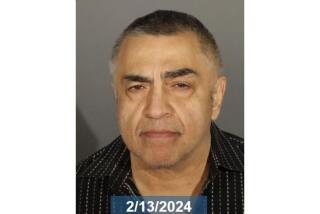Palestinian Officers Deny Taking Part in Slayings
- Share via
RAMALLAH, West Bank — In an airless, smoke-filled room at the Palestinian Authority’s headquarters here, Col. Tawfiq Tirawi’s men on Monday defended him--and themselves--from Israeli accusations of direct involvement in a deadly campaign against reported Arab land dealers.
“There is nothing in this,” said the man behind the desk, a senior officer for the Palestinian General Intelligence Service in this West Bank city. “The Israelis are trying to divert attention from the problems with the peace process. They want to harm the Palestinians’ reputation with these lies.”
The intelligence officer, a slight, graying man in a bright blue-and-pink shirt, said he could not be identified by name. But he and others in the room said Tirawi, who heads the service, and those who work for him had nothing to do with the recent execution-style slayings of two men who are said to have sold land to Jews, nor with what Israel describes as the attempted kidnapping of another last weekend.
“We do not do anything against the law,” a second officer said.
But Jerusalem Police Chief Yair Yitzhaki on Monday named Tirawi as the man behind the recent Palestinian campaign against real estate dealers. The bodies of three men have been found dumped on roadways outside Ramallah since Palestinian Justice Minister Freih abu Medeen announced last month that Arabs who sell land to Jews could face the death penalty. Two of the victims were Jerusalem residents with Israeli citizenship.
The killings have marked the return here of a bitter, historic struggle over control of the land that both sides claim. Palestinians consider those who sell Arab-owned property to Israelis to be traitors, selling off their homeland bit by bit to the enemy. Israelis, however, see the Palestinian policy against land sales as racist and repugnant.
Tirawi has denied complicity in the killings, as have other Palestinian officials. The Palestinian Authority, in reinstating an old Jordanian law in the West Bank, plans to arrest and investigate those suspected of land sales to Jews, leaving their fate up to a court of law, not vigilantes, the officials said.
On Monday, however, Israel stepped up its own campaign against the violence. Amid media reports that more than a dozen Palestinians were on a Palestinian Authority hit list for selling land to Jews, Prime Minister Benjamin Netanyahu warned that the attacks are a further blow to the faltering peace process.
The land sale violence “is simply turning the peace process on its head,” Netanyahu said in an interview with Israel’s Army Radio. He said it was “utterly inconceivable” that peace talks would be held with Palestinians while “Arab residents of Jerusalem are being murdered.”
The prime minister charged that “leading figures in the Palestinian Authority . . . have clearly expressed their support for the murders.”
Negotiations between the Israelis and Palestinians broke off in mid-March when Israel began construction on a new Jewish neighborhood on the traditionally Arab side of Jerusalem. U.S. and Egyptian efforts to coax the two sides back to the bargaining table have been unsuccessful.
After an emergency meeting Monday with his security chiefs, Netanyahu said Israel will issue warrants for the arrest of those involved in the killings, and take steps to safeguard the lives of land dealers. Israeli television later reported that police will distribute panic buttons and stun grenades to the agents to help protect them.
The Israeli police have accused the General Intelligence Service, one of five main Palestinian security forces, of direct links to two of the recent killings: those of Farid Bashiti, 70, and Ali Mohammed Jumhour, 34. Bashiti’s body was found May 9; Jumhour, who was questioned by Tirawi’s officers last week, was found Saturday shot in the head.
Yitzhaki, the Jerusalem police chief, also has said that his officers thwarted an attempted abduction of another land dealer by the Palestinian security branch.
In the Ramallah headquarters, though, the intelligence officers denied that they were involved in a kidnapping. On the contrary, they said, six Palestinians who were arrested after the high-speed chase by Israeli police were not abducting Assad Rajabi, 65, but taking him in for questioning.
They also displayed a handwritten affidavit, which they said contained Jumhour’s responses to their questions during a lengthy session with police May 27, four days before he was found dead. In it, Jumhour admitted involvement in a single property transaction with Israelis, and named his partner as Rajabi.
The two men worked together to sell an Arab house to Jews in the mixed neighborhood of Abu Tor in East Jerusalem, the document said. Jumhour said he had received about $15,000 for his part in the deal and had used the money to build a second floor on his home.
“His conscience was really bothering him,” one officer said of Jumhour’s admission. “He came here on his own to talk to us and tell us that he regretted what he had done.”
Safely back home Monday in his three-story dwelling in the Shuafat refugee camp near Jerusalem, Rajabi denied that he had ever sold land to Israelis. But otherwise, he confirmed much of the Palestinian account of the incident early Sunday.
He said he did not know why the police asked him to go with them to Ramallah but said he did so voluntarily. His son, Mohammed, and other family members accompanied him, he added, but they were stopped en route by Israeli police, who forced them to go to Jerusalem for interrogation.
Mohammed Rajabi accused the Israelis of trying to use his father’s situation for political gain. “What the Israelis have said about this is not right at all,” he said. “It’s absolutely not true.”
Saida Hamad of The Times’ Jerusalem Bureau contributed to this report.
More to Read
Sign up for Essential California
The most important California stories and recommendations in your inbox every morning.
You may occasionally receive promotional content from the Los Angeles Times.










